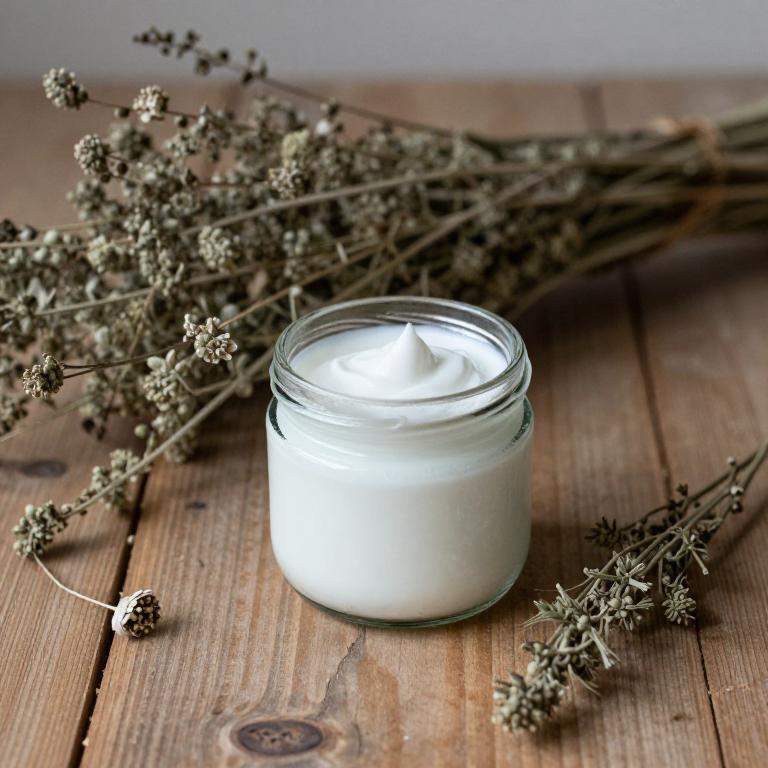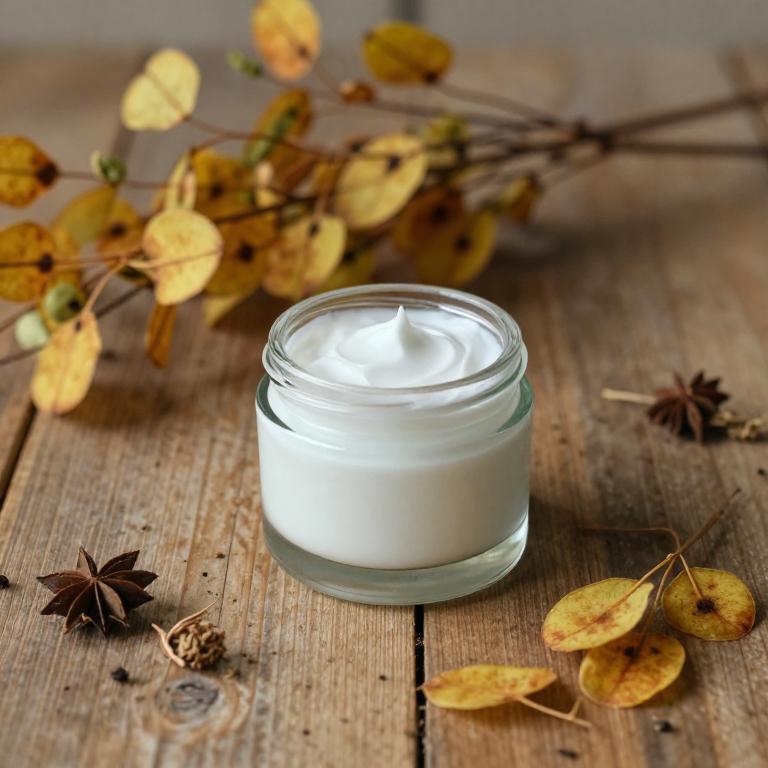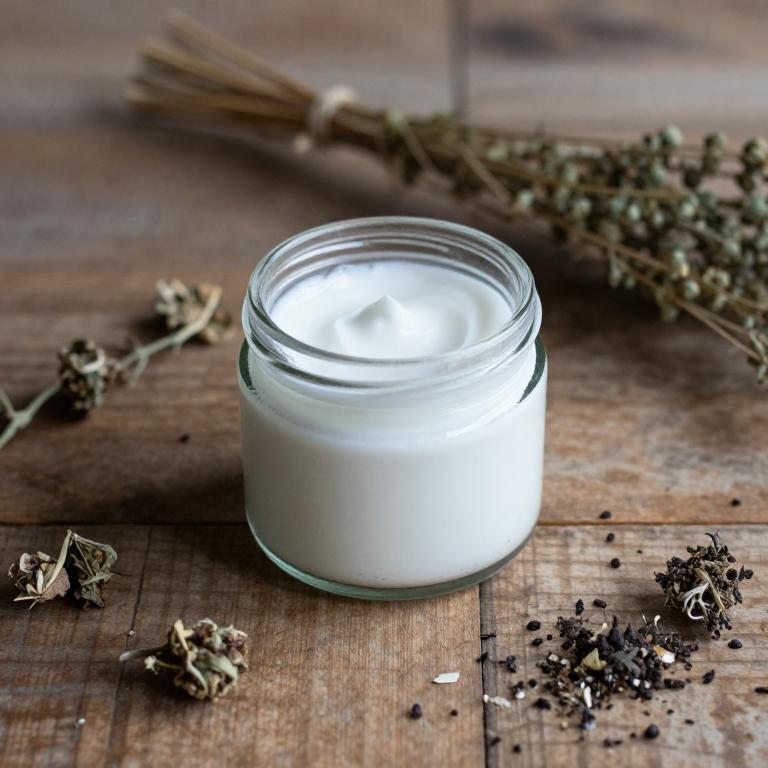10 Best Herbal Creams For Itchy Scalp

Herbal creams for an itchy scalp are natural remedies that often contain ingredients like tea tree oil, lavender, chamomile, and calendula, which are known for their soothing and anti-inflammatory properties.
These creams can help alleviate irritation, reduce dandruff, and promote a healthier scalp environment by balancing moisture and preventing fungal growth. They are typically preferred by individuals seeking alternative treatments to conventional medicated shampoos or lotions. Many herbal scalp creams are gentle and suitable for sensitive skin, making them a popular choice for long-term use.
However, it's important to consult a healthcare professional to ensure they are appropriate for specific scalp conditions.
Table of Contents
- 1. Aloe vera (Aloe barbadensis)
- 2. Field horsetail (Equisetum arvense)
- 3. Melaleuca (Melaleuca alternifolia)
- 4. Lemon grass (Cymbopogon citratus)
- 5. St. john's wort (Hypericum perforatum)
- 6. Ginger (Zingiber officinale)
- 7. Stinging nettle (Urtica dioica)
- 8. English lavender (Lavandula angustifolia)
- 9. Salvia (Salvia officinalis)
- 10. Rosemary (Rosmarinus officinalis)
1. Aloe vera (Aloe barbadensis)

Aloe barbadensis, commonly known as aloe vera, is often incorporated into herbal creams designed to soothe an itchy scalp.
These creams leverage the anti-inflammatory and moisturizing properties of aloe vera to reduce irritation and promote scalp health. The gel-like consistency of aloe vera provides a cooling effect, which can help alleviate discomfort caused by dandruff, eczema, or psoriasis. Additionally, aloe barbadensis contains vitamins, minerals, and antioxidants that support skin regeneration and strengthen the scalp's natural defenses.
When used regularly, aloe-based herbal creams can offer a natural and effective remedy for persistent scalp itchiness.
2. Field horsetail (Equisetum arvense)

Equisetum arvense, commonly known as horsetail, is a herb rich in silica and other minerals that can help strengthen hair and soothe an itchy scalp.
When incorporated into herbal creams, it provides a natural remedy for scalp irritation, promoting healing and reducing inflammation. These creams often combine horsetail with other soothing ingredients like aloe vera or chamomile to enhance their calming effects. The anti-inflammatory and antioxidant properties of equisetum arvense make it effective in addressing conditions such as dandruff or fungal infections.
Regular use of such creams can lead to a healthier scalp and improved hair growth over time.
3. Melaleuca (Melaleuca alternifolia)

Melaleuca alternifolia, commonly known as tea tree oil, is a popular natural ingredient used in herbal creams for itchy scalp due to its antimicrobial and anti-inflammatory properties.
These creams often combine tea tree oil with other soothing ingredients like coconut oil, aloe vera, or calendula to enhance their effectiveness and provide additional moisturization. The anti-fungal and antibacterial qualities of tea tree oil can help alleviate conditions such as dandruff, seborrheic dermatitis, and fungal infections that contribute to an itchy scalp. Many users report reduced itching and irritation after regular use of these herbal creams, making them a gentle alternative to chemical-based treatments.
However, it is important to perform a patch test before applying any new topical product to ensure there is no allergic reaction.
4. Lemon grass (Cymbopogon citratus)

Cymbopogon citratus, commonly known as lemon grass, is a natural herb often used in the formulation of herbal creams for itchy scalp due to its soothing and antifungal properties.
These creams typically contain essential oils extracted from lemon grass, which help reduce inflammation and irritation on the scalp. The antibacterial and antiseptic qualities of lemon grass can effectively combat dandruff and other scalp infections that contribute to itching. Regular application of these herbal creams may provide relief from persistent itchiness and promote a healthier scalp environment.
As a natural alternative to chemical-based treatments, cymbopogon citratus creams are increasingly popular for their gentle yet effective approach to scalp care.
5. St. john's wort (Hypericum perforatum)

Hypericum perforatum, commonly known as St. John's Wort, is a herbal remedy that has been traditionally used for its anti-inflammatory and antiseptic properties.
When formulated into a cream, it can be applied to an itchy scalp to help soothe irritation and reduce redness. The active compounds in hypericum perforatum, such as hypericin and flavonoids, may help alleviate scalp conditions like eczema or psoriasis by calming inflammation. However, it is important to consult a healthcare provider before using it, especially if you are on medications, as it can interact with certain drugs.
Overall, hypericum perforatum herbal creams offer a natural alternative for managing itchy scalp symptoms, though results may vary among individuals.
6. Ginger (Zingiber officinale)

Zingiber officinale, commonly known as ginger, has been traditionally used for its anti-inflammatory and antifungal properties, making it a valuable ingredient in herbal creams for itchy scalp.
These creams often contain ginger extract, which helps to soothe irritation and reduce redness caused by dandruff or fungal infections. The warming effect of ginger can improve blood circulation to the scalp, promoting healthier hair growth and reducing itchiness. Many users report relief from persistent scalp itch after using ginger-based topical treatments regularly.
However, it is important to consult a dermatologist before using such creams, especially if the scalp condition is severe or chronic.
7. Stinging nettle (Urtica dioica)

Urtica dioica, commonly known as stinging nettle, is a herb that has been traditionally used for its anti-inflammatory and soothing properties.
Urtica dioica herbal creams are formulated to alleviate symptoms such as itching and irritation on the scalp, making them a popular natural remedy for conditions like dandruff or eczema. These creams often contain extracts of the plant's leaves, which are rich in minerals and antioxidants that can help reduce inflammation and promote scalp health. The cooling effect of the herb can provide immediate relief from itchiness, while its natural ingredients support long-term scalp wellness.
When used consistently, urtica dioica herbal creams may offer a gentle and effective alternative to conventional treatments for an itchy scalp.
8. English lavender (Lavandula angustifolia)

Lavandula angustifolia, commonly known as English lavender, is often incorporated into herbal creams designed to soothe an itchy scalp.
These creams harness the calming and anti-inflammatory properties of lavender essential oil, which can help reduce irritation and redness associated with scalp conditions. The natural antifungal and antibacterial components in lavender may also aid in preventing infections that contribute to persistent itching. When applied topically, lavender-infused creams can provide a gentle, soothing effect that promotes scalp health and comfort.
As a natural alternative to conventional treatments, these herbal creams are popular for their mild, aromatic scent and potential to offer relief without harsh side effects.
9. Salvia (Salvia officinalis)

Salvia officinalis, commonly known as sage, is a herb often used in the formulation of herbal creams designed to alleviate an itchy scalp.
These creams typically contain extracts from the leaves of the plant, which are rich in antioxidants and anti-inflammatory compounds. The soothing properties of sage can help reduce irritation and redness associated with conditions like dandruff or seborrheic dermatitis. When applied topically, the cream can provide a cooling effect that may offer relief from persistent itching.
However, it is important to consult a healthcare professional before using such creams, especially if the scalp condition is severe or persistent.
10. Rosemary (Rosmarinus officinalis)

Rosmarinus officinalis, commonly known as rosemary, is a popular herbal ingredient used in the formulation of scalp creams to alleviate itchiness and promote scalp health.
These creams often contain rosemary essential oil, which is known for its antimicrobial and anti-inflammatory properties that can help reduce irritation and dandruff. The soothing aroma of rosemary also provides a calming effect, enhancing the overall experience of using the cream. Regular application of rosemary-based scalp creams can improve blood circulation to the scalp, potentially supporting hair growth and reducing scalp sensitivity.
However, it is important to perform a patch test before use, as some individuals may experience allergic reactions to the essential oils in these products.